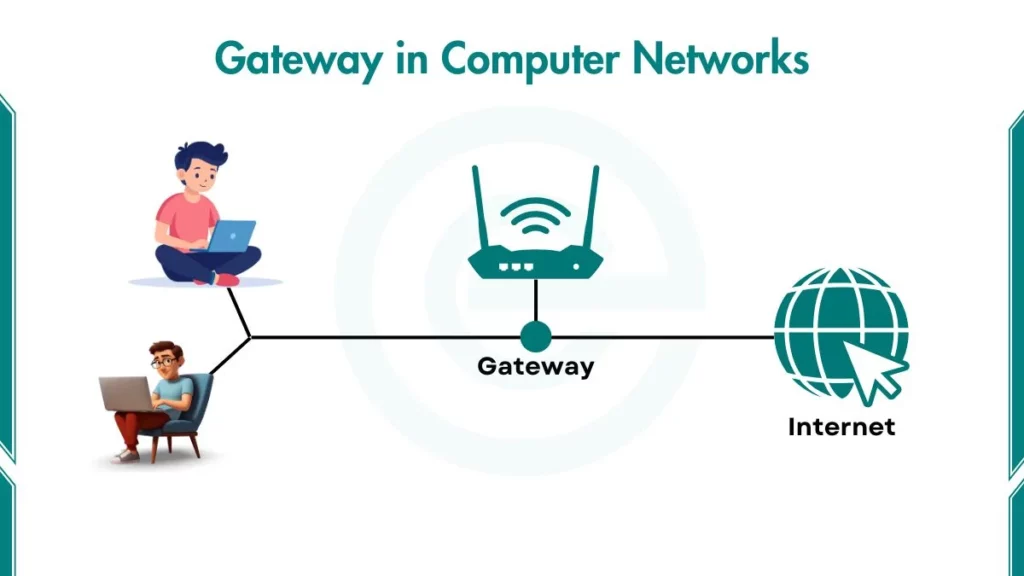In computer networks, a gateway is a networking device that connects two different networks. It acts like a bridge, allowing data to flow between systems that use different communication rules.
Imagine you speak English, and your friend speaks Spanish. To communicate, you need a translator. A gateway works like a translator for computer networks.
Gateways are important because they help different networks understand each other. Without them, many internet services, smart devices, and online systems would not work properly.

How does Gateway work in Network?
A gateway takes data from one network, changes its format, and sends it to another network. Here’s how it works step by step:
- A device (like your laptop) sends data to a different network.
- The gateway receives this data.
- It checks the rules (protocols) of the destination network.
- If the rules are different, the gateway translates the data.
- Finally, it sends the converted data to the correct destination.
For example, if an email is sent from a Gmail server (using one protocol) to a company server (using a different protocol), the gateway makes sure both systems understand each other.
Types of Gateways in Networking
Gateways come in different types based on their use. Here are the types of gateways:
1. Protocol Gateways
Protocol gateways act as translators between different network communication rules (protocols). Networks often use different protocols, and these gateways make sure data moves smoothly between them.
For example, when you visit a secure website, your browser uses HTTP (Hypertext Transfer Protocol). But when you enter payment details, the site switches to HTTPS (the secure version). A protocol gateway handles this conversion automatically.
2. Cloud Gateways
Cloud gateways connect local networks (like office computers) to cloud storage services such as Google Drive, Dropbox, or Amazon Web Services (AWS).
Here’s how they work:
- A business stores files on its servers.
- The cloud gateway takes these files and securely uploads them to the cloud.
- Employees can then access these files from anywhere.
Cloud gateways also help in backup systems. Instead of manually saving files to the cloud, the gateway automatically syncs data.
3. IoT Gateways
IoT (Internet of Things) gateways connect smart devices like thermostats, security cameras, and smart lights to the internet.
Imagine you have a smart home system:
- Your smart bulb uses Zigbee or Z-Wave (special wireless protocols).
- Your phone uses Wi-Fi or mobile data.
- An IoT gateway sits in the middle, translating signals so your phone can control the bulb.
These gateways also improve security. Instead of every smart device connecting directly to the internet (which could be risky), the gateway acts as a single, secure entry point.
4. Voice Gateways
Voice gateways facilitate internet-based phone calls (VoIP). Traditional phone lines use analog signals, but VoIP converts voice into digital data packets.
Here’s how they function:
- When you make a VoIP call (like on Skype or WhatsApp), your voice is converted into digital data.
- A voice gateway ensures this data reaches regular phone networks if you call a landline.
- It also handles call quality, security, and connection stability.
Businesses use voice gateways to connect office phone systems to external networks. It allows employees to make calls over the internet instead of traditional phone lines.
Features of a Gateway
A gateway has several important functions:
- Protocol Conversion – It changes data formats so different networks can communicate.
- Security Check – Many gateways have firewalls to block harmful data.
- Hardware or Software – Some gateways are physical devices, while others are programs.
- Network Connection – It links LANs, WANs, and the Internet.
Difference Between Gateway, Router, and Modem
| Gateway | Router | Modem |
|---|---|---|
| Connects different networks with different protocols | Directs data packets within the same network | Connects your home network to the ISP (Internet Service Provider) |
| Translates between different protocols (e.g., HTTP to HTTPS) | Works with the same protocol (e.g., only IP) | Only modulates/demodulates signals (no protocol conversion) |
| Connects entirely different networks (e.g., LAN to WAN, VoIP to PSTN) | Connects devices within the same network (e.g., home devices to each other) | Connects a single network to the Internet |
| Often includes firewalls and security checks | May have basic firewall protection | Typically no security features |
| Email gateway converting between email protocols | Home Wi-Fi router directing traffic between devices | Cable modem connects your house to the ISP |
| Most advanced (can do routing + protocol conversion) | Moderate (routes traffic but doesn’t translate protocols) | Simplest (connects to internet) |
Also read Difference Between Gateway and Switch for more information.
Why Are Gateways Important?
Gateways make modern networking possible. Here’s why they matter:
- They connect incompatible networks – Without gateways, some devices couldn’t talk to each other.
- They improve security – Gateways can filter viruses and hackers.
- They support smart technology – IoT devices (like smart TVs) rely on gateways.
- They help in internet access – Your home Wi-Fi router acts as a gateway.
